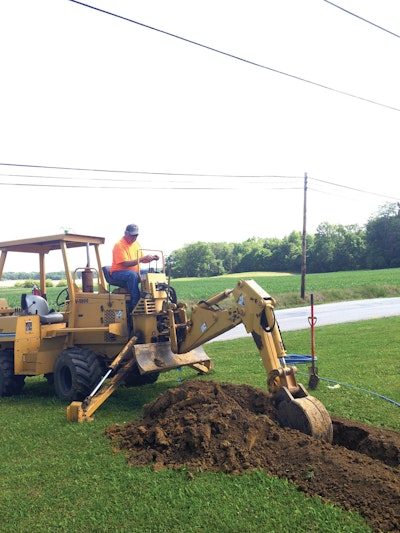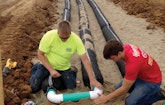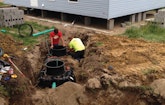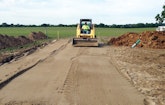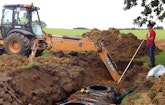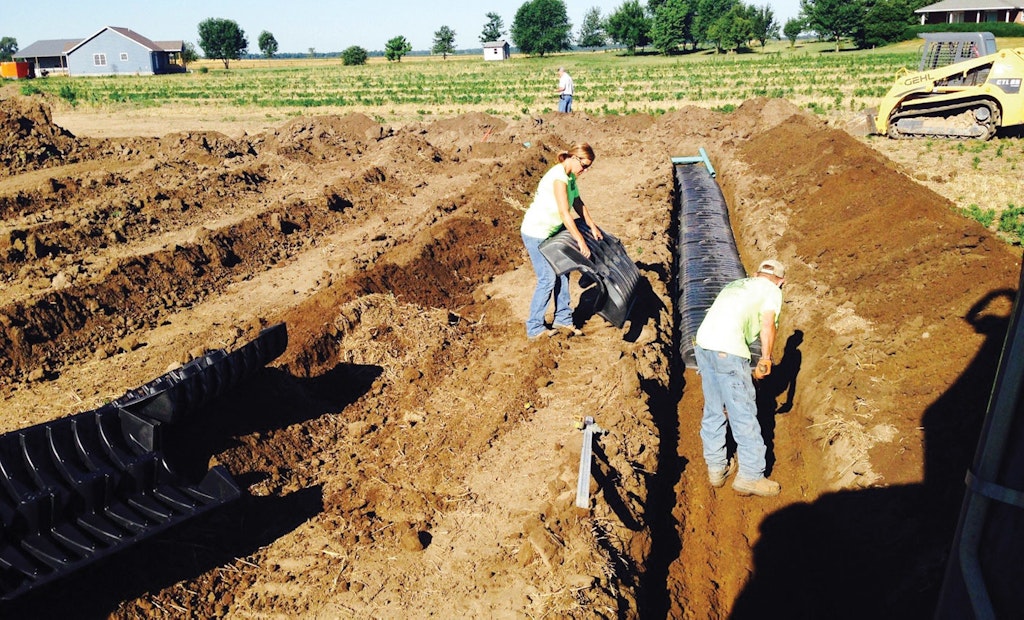
Lisa Black and Kelly Kaeck install Infiltrator Water Technologies Quick4 Plus chambers in a drainfield. A Mustang-Gehl CTL85 skid-steer is used to backfill.
Location, location, location — so goes the common saying to explain why a business venture worked or didn’t work. Location is one reason why Black’s Excavation has succeeded in Wheatland, Indiana, for 21 years. Hard work, good service, and an attitude of getting the job done, whatever that job may be, are also part of the picture.
Although Wheatland looks isolated in the toe of Indiana about 60 miles from Evansville and the Kentucky border, the location is perfect. Three small cities — Vincennes, Washington and Petersburg — are within a 15-mile radius of the shop. They provide plenty of work for Black’s Excavation, as do area coal mines that have their own water runoff needs and help add to the diversity of the company’s revenue stream.
STANDARD DESIGNS
Wastewater systems in this part of the country are straightforward. It’s septic tanks and drainfields. Advanced treatment units are not common. Most of the time, conditions don’t require advanced treatment, and those systems are more expensive than customers want. There is a high water table on about half of the jobs, and all of the systems Black’s Excavation installs are individual ones.
Farms need drainage ditches and ponds cleaned. The mine work includes cleaning out settling ponds that hold all the groundwater pumped up from a mine. The company also does housing site-prep excavation.
“We’ve always been really lucky to keep the local market here working for contractors. It’s been steady, and believe it or not, when the coal market went down, it seemed like the housing market went up. We’ve done a lot of work for new-home construction in the last couple of years,” says Colby Black who owns the company with his dad, Jeff Black.
He mentions the advantage of being almost equally distant from the three small cities. That’s where housing growth is and where Black’s Excavation has found work in new rural subdivisions beyond the municipal sewer systems.
“For the last few years, we’ve used poly tanks. That’s all we’ve put in. We’ve had very good luck with them. They seal up well. They’re watertight. They’re lightweight. Two or three guys can probably pick one up and unload it from a trailer if there is a need,” Black says.
Once it’s in a hole, you can push a plastic tank around to make everything line up. And poly tanks are expected to have a long life, he says. The big savings is time. A crew doesn’t lose productive hours waiting on a crane or delivery truck that’s late.
The Blacks prefer Infiltrator Water Technologies tanks, and for some installations, they also like Infiltrator Water Technologies chambers. They also use Infiltrator Water Technologies’ ATL system, which includes a 4-inch corrugated pipe wrapped with synthetic aggregate and a geotextile fabric, and bedded in sand. The systems typically require less space than a conventional drainfield, he says.
“We do a lot of system repairs, and in most cases, the old septic system is abandoned in place so there is no room on the lot for a new full-sized drainfield,” Black says.
CLOSE TO HOME
Black’s Excavation does most of its work within a 15- to 20-mile radius of its shop. They’ve done some work near Evansville and crossed the Wabash River into Illinois for mine work, but that doesn’t happen often.
The business breaks down as about 45 percent moving dirt in some way, such as cleaning mine settlement ponds or farm drainage ditches; 40 percent drain, sewer, and septic work; 10 percent trucking; and 5 percent trenching and other work. There was a discussion among the Black family about how much work should fit into each of those categories.
“It’s hard to break it down because we offer such a broad range of services. If it can be done with the equipment we have, we’ll do it no matter what it is. We do something different almost every day,” Black says.
Waterline and sewer line work is mostly in the rural subdivisions. Quite a bit of the repair work comes to Black’s Excavation because of the inspections that mortgage lenders require at the time a home is sold. Inspections find drainfields not properly laid or a system that just doesn’t work well and needs troubleshooting.
QUALITY COUNTS
With all the work Black’s Excavation does, you would expect a big crew, but that’s not the case.
“We had more employees five, six, seven years ago,” Colby Black says. “There was an active coal mine about 4 to 5 miles away from our shop, and we did a lot of maintenance out there with our heavy equipment. When that mine shut down, we decided to downsize to keep the quality up. It seemed like if my dad or myself wasn’t on the job all the time, we weren’t happy with the work that was done.”
“Finding people who take pride in their work was the problem,” Jeff Black says. “Or they’d take a shortcut and think it doesn’t matter because the work is covered with dirt. But we’re the guys who had to go back and fix it, and we don’t want a reputation of always needing to come back and fix our work. We’d rather do less work and do it right than do more work and have to go back.”
Finding good, versatile workers is a challenge in the market where some employers pay good money, especially the mines, and equipment operators want high pay. A desire for good pay is understandable, especially for full-time heavy equipment operators, Black says. But the work Black’s Excavation does is diverse, and it’s hard to justify top dollar for someone using a shovel.
“We don’t feel we can pass that cost on to a customer. We try to be as reasonable as possible, and I think that’s why we’ve had good success with our business. We don’t overprice, and people get a good job for the money they’re paying.”
Chance Black, Jeff Black’s younger son, helps out in the family business, but he’s still in high school, so his help is limited to summer months. Kelly Kaeck, the main nonfamily employee has been with the company for 15 years and knows the area and the jobs very well. He has two weeks of paid vacation a year from the company. Once he was hurt on the job, and the Blacks helped him through that period of not working. Taking care of their people is how the Blacks do business, and at this point, Kaeck is considered part of the family because he has been so good for so long.
REFERRALS ARE KEY
Reputation is the reason Black’s Excavation does very little marketing.
“We really don’t mail anything out to people. Most of our business is word-of-mouth. We do a little advertising, but not a whole lot,” Jeff Black says. They used to buy space in a local advertising directory, but the price eventually exceeded the value. “I’d ask people where they heard about us, and most of them would say they heard about us from someone else,” he says.
What advertising they do is primarily through the local school. The company backs the athletic department, and it sponsors three-point shots at basketball games. With every long-range basket, the radio announcer calls out a Black’s Excavation three-point shot.
The company has been listed with the Better Business Bureau since 2009. No one has made a complaint, says Jeff Black’s wife, Lisa.
“And the contractors are valuable, too,” Jeff Black says. “If we have 15 carpenters who build houses and they all see our name out on a job, that’s good. Even if they build only one house a year, we’ll usually get that work.”
The company website has not only the office phone, but also the cellphone numbers for Jeff Black and Colby Black. That’s because Lisa Black is in the office only part of the time. At other times, she’s out driving truck, getting parts, or helping on job sites. And bookkeeper Sherry Davis, who has been with the business since Jeff Black started it, is in the office only a couple of days each week.
Publishing cellphone numbers hasn’t caused a problem with late night phone calls about unimportant issues. Occasionally people will call late in the evening, but if they’re faced with a broken pipe, it’s better that they call, Jeff Black says.
“We feel that if we’re going to be offering a service, then people need to reach us,” Black says.
EQUIPMENT INVENTORY
Given the Black’s Excavation workload, the company needs a wide variety of equipment. They have:
- A 2010 Hyundai 290 excavator (useful because of its 60-foot reach).
- A 2014 Case 590 rubber-tired backhoe.
- A 2004 Komatsu America 220 trackhoe.
- A 1999 Kobelco Construction Machinery USA 300 trackhoe.
- A 2006 Mustang-Gehl CTL85 tracked skid-steer.
- A 1999 Volvo Construction Equipment tri-axle dump truck, bought used, with a 10-ton Trail King Industries trailer.
- Two 10-wheel dump trucks, one a 2008 International and the other a 1995 International.
- A 50-ton Dynaweld low-boy trailer.
- A newly purchased Diamond C Trailers tilt-top trailer to move smaller equipment.
- A 2003 New Holland Construction tractor and 6-foot tiller for finish work.
- A 1999 Vermeer trencher.
- Four bulldozers, all Cat: a 1969 D7, a 1985 D7 LGP, a 1988 D5H LGP, and a 1999 D6R LGP.
ALL THE RIGHT MOVES
From a part-time start in 1997, Jeff Black moved up to a full-time business in 2003. He’s been at it ever since. He knew when growing the company was the right thing to do, and he downsized when it was the right thing for his company — which meant it was the right thing for his customers.
Keeping coal clean
In addition to doing wastewater work at homes and businesses in southern Indiana, the crew at Black’s Excavation in Wheatland, Indiana, has developed an additional business in cleaning settling ponds at coal mines.
“They have to keep all the water on their property, so all the ditches and the groundwater will go into a settling pond. Then it will go through another pond before it goes off the property,” says Jeff Black, company co-owner.
How often ponds need cleaning depends on the mine. Some mines are more active than others, so some ponds must be cleaned every year, while others need cleaning only once every 10 years.
But every year the Black’s Excavation crew must do eight hours of mine safety training. When they arrive at a mine for work, they are checked for the right clothing and shoes, safety glasses, hard hats, and fire extinguishers. “They check everything. All the equipment has to be up to the right specifications,” Black says.
The incentive for the mine owner is not getting a citation because if there is a government inspector on site and the Black’s Excavation crew receives a violation, so does the mine. In the case of a rule violation that endangers life, the fine could amount to thousands of dollars.
Black’s Excavation has had only one citation, and it was minor. The crew went to dinner, and when they parked, they turned off the headlights on their vehicles. Rules dictate headlights must be on while on the mine site. When they went back to the job, a federal inspector asked to check their headlights. As luck would have it, the dimmer switch in Lisa Black’s truck was bad, and the lights didn’t come on. The inspector said he wouldn’t cite her, but a $150 ticket showed up in the mail later.
